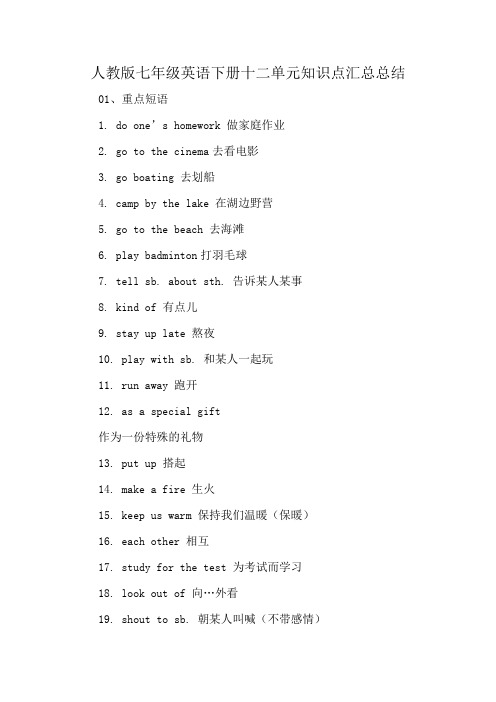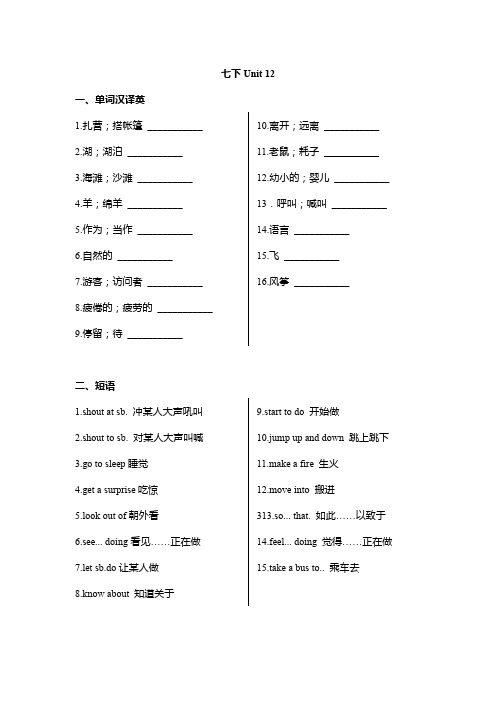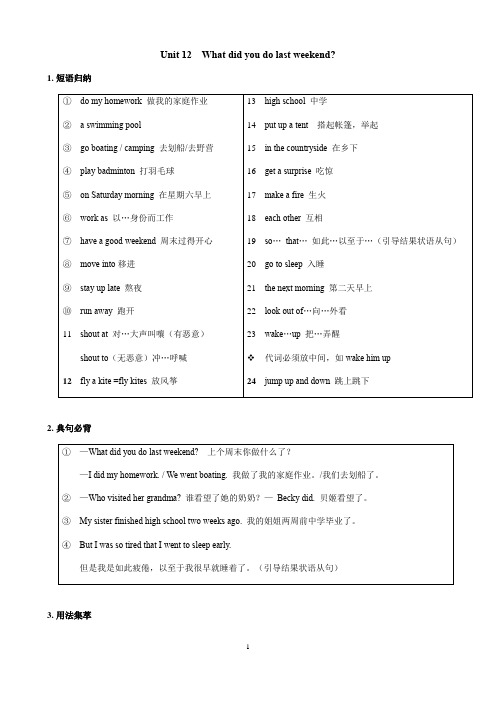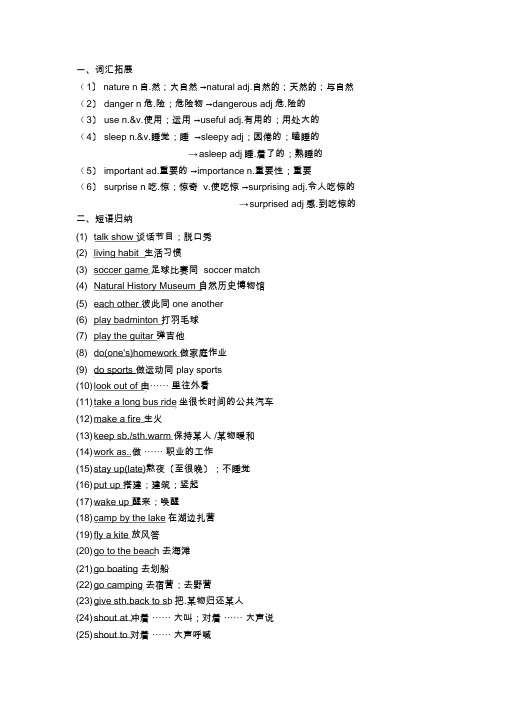人教版英语七年级下册第十二单元短语语法知识点总结
人教版七年级英语下册十二单元知识点汇总总结

人教版七年级英语下册十二单元知识点汇总总结01、重点短语1. do one’s homework 做家庭作业2. go to the cinema去看电影3. go boating 去划船4. camp by the lake 在湖边野营5. go to the beach 去海滩6. play badminton打羽毛球7. tell sb. about sth. 告诉某人某事8. kind of 有点儿9. stay up late 熬夜10. play with sb. 和某人一起玩11. run away 跑开12. as a special gift作为一份特殊的礼物13. put up 搭起14. make a fire 生火15. keep us warm 保持我们温暖(保暖)16. each other 相互17. study for the test 为考试而学习18. look out of 向…外看19. shout to sb. 朝某人叫喊(不带感情)20. shout at sb. 朝某人叫喊(带感情)21. jump up and down 跳上跳下22. a second language 第二语言23. finish high school中学毕业24. get a surprise 吃惊25. work as a guide 做导游工作26. wake sb. up 弄醒某人02、重点句子Grammar Focus 句子1.What did you do last weekend?你上周末做了什么事情?2. I did my homework. / We went boating. 我做了家庭作业。
/ 我们去划船了。
3. Who visited her grandma?Becky did.谁去看望了她的奶奶?Becky去了。
4. Where did she go last weekend?她上周末去了哪里?5. She went to a farm.她去了一个农场。
(完整版)人教版英语七年级下册第十二单元短语语法知识点总结

Unit 12What did you do last weekend?.【短语归纳】1. do my homework 做我的家庭作业2. go to cinema 去看电影3. go boating / camping 去划船/ 去野营4. play badminton 打羽毛球5. on Saturday morning 在星期六早上6. work as 以……身份而工作7. have a good weekend 周末过得愉快8. kind of 有点儿9. stay up late 熬夜10. run away 跑开11. shout at 对……大声叫嚷12. fly a kite 放风筝13. high school 中学14. put up 搭起,举起15. in the countryside 在乡下16. get a surprise 吃惊17. make a fire 生火18. each other 互相19. so… that… 如此……以至于…… 20. go to sleep 入睡21. the next morning 第二天早上22. look out of…向……外看23. shout to 冲……呼喊24. up and down 上上下下25. wake…up 把……弄醒26. move into… 移进……【用法集萃】1. go + doing 去做某事2. play + 球类玩……球3. 时间段+ ago ……前4. keep + sb. / sth. + 形容词/ 副词/ 介词短语使……保持……5. so + 形容词/ 副词+ that 句子如此……以至于……6. see sb. doing sth. 看见某人正在做某事7. let sb. do sth. 让某人做某事8. start to do / doing sth. 开始做某事┃语法探究┃┃.一般过去时态┃谓语动词为be:肯定句:主语+was/were +其他.否定句:主语+was/were +not +其他.一般疑问句:Was/Were +主语+其他?两种回答:Yes,…was;No,…wasn't.特殊疑问句:特殊疑问词+was/were +主语+其他?谓语动词为实义动词:肯定句:主语+过去式+其他.否定句:主语+didn't +动词原形+其他.一般疑问句:Did +主语+动词原形+其他?两种回答:Yes, … did; No,… didn't.特殊疑问句:特殊疑问词+did +主语+动词原形+其他?如:My weekend was pretty good.→My weekend wasn't pretty good.→Was your weekend pretty good?→Yes, it was; No, it wasn't.→How was your weekend?She went to Beijing last week.→She didn't go to Beijing last week.→Did she go to Beijing last week?→Yes, she did; No, she didn't.→Who went to Beijing last week?→Where did she go last week?→When did she go to Beijing?┃.感叹句感叹句通常由what, how引导,表示赞美、惊叹、喜悦等感情。
Unit12单词短语句型知识点总结人教版英语七年级下册

七下Unit 12一、单词汉译英1.扎营;搭帐篷___________2.湖;湖泊___________3.海滩;沙滩___________4.羊;绵羊___________5.作为;当作___________6.自然的___________7.游客;访问者___________8.疲倦的;疲劳的___________9.停留;待___________ 10.离开;远离___________11.老鼠;耗子___________12.幼小的;婴儿___________ 13.呼叫;喊叫___________14.语言___________15.飞___________16.风筝___________二、短语1.shout at sb. 冲某人大声吼叫2.shout to sb. 对某人大声叫喊3.go to sleep睡觉4.get a surprise吃惊5.look out of朝外看6.see... doing看见……正在做7.let sb.do让某人做8.know about 知道关于9.start to do 开始做10.jump up and down 跳上跳下11.make a fire 生火12.move into 搬进313.so... that. 如此……以致于14.feel... doing 觉得……正在做15.take a bus to.. 乘车去三、句型1. 我老爸后来告诉我,蛇没有耳朵,但能感觉到物体的移动。
My dad told me later that snakes don’t have ears but can feel things moving.2. 他也告诉我不要接近蛇很重要。
He also told me it was important not to go near a snake.3. 对于我来说,这是一次非常有用的教训。
This was a very useful lesson for me.4. 大家周末都过得好吗Did everyone have a good weekend?5. 这样就把蛇弄醒了,它爬进了湖边的森林里。
人教版七年级英语下册Unit12知识点归纳

Unit12 What did you do last weekend?知识点归纳一、重点短语1. last weekend 上周末2. do one’s homework 做作业3. go to the cinema 看电影4. go boating 去划船5. camp by the lake 在湖边露营6. go to the beach 去海滩7. play badminton 打羽毛球8. on Saturday morning 在周六的早上9. study for the English test 为了英语考试学习10. feed some cows 喂一些奶牛11. work as a guide 做为一个导游工作12. Natural History Museum 自然历史博物馆13. butterfly house 蝴蝶馆14. over 200 kinds of butterflies 超过200多种蝴蝶15. tell sb about … 告诉某人关于…16. living habits 生活习惯17. be kind of tired 有点儿累19. stay up 熬夜20. play with sb. 和某人玩21. lose things 丢东西22. run away 跑开23. fly a kite 放风筝24.as a special gift 作为一个特殊的礼物25. take sb. to sp. 把某人带到某地26. go camping 去露营27. put up the tents 搭建帐篷28. make a fire 生火29. keep sb. warm 使某人保持温暖30. on the first night 在第一天晚上31.so...that... 如此…以至于…32. go to sleep 去睡觉33. get a surprise 吃惊34. see sb. doing sth. 看见某人正在做某事35. jump up and down 上蹦下跳36. climb onto one’s back 爬到某人背上37. shout at/shout to 大声喊叫38 wake …up 把...弄醒39. move into… 移入,爬进…中40. a useful lesson 有用的一课二、用法归纳1. go + doing 去做某事2. play + 球类玩……球3. 时间段+ ago ……前4. keep + sb. / sth. + 形容词/ 副词/ 介词短语使……保持……5. so + 形容词/ 副词+ that 句子如此……以至于……6. see sb. doing sth. 看见某人正在做某事7. let sb. do sth. 让某人做某事8. start to do / doing sth. 开始做某事三、重点句子1. —What did you do last weekend? 上个周末你做什么了?—I did my homework. / We went boating. 我做了我的家庭作业。
人教版七年级下册英语Unit 12 知识点语法归纳总结

Unit 12 What did you do last weekend?1.短语归纳2.典句必背3.用法集萃(1)What did you do last weekend? 你上周末做了什么?❖last 作形容词时,意为“最后的,最末的”或者“紧接前面的,刚过去的”。
例如:Today is the last day in the year. 今天是今年的最后一天。
I didn’t sleep well last night. 昨晚我没睡好。
❖last作副词时,意为“最后地”,例如:I’m the last one. 我是最后一个。
❖last 做动词时,意思是“持续,继续,维持”等,例如:The hot weather lasted a week. 炎热的天气持续了一周。
(2)How interesting! 多有趣啊!❖本句是how引导的感叹句,how用来修饰形容词或副词,此类感叹句的结构为:“How+形容词/副词( +主语+谓语)!”。
例:How beautiful the girl is! 这个女孩真漂亮啊!How fast the boy is running ! 那个男孩跑得真快啊!❖what也可以引导感叹句,what用来修饰名词。
常见的结构有:(3)I stayed up late to watch the soccer game. 我熬夜到很晚看了足球赛。
❖stay up是固定搭配,意为“熬夜”。
例:She stayed up until 2 :00 am. 她熬夜熬到凌晨两点。
❖常见的“动词+up”结构的短语还有:(4)The cat quickly ran away. 那只猫飞快地逃跑了。
❖run away意为“逃跑;跑开”,其中run意为“跑”,过去式是ran,属于不规则变化。
例:The thief tried to run away, but he failed. 那个小偷试图逃跑,但失败了。
人教版七年级下册英语12单元知识点总结与练习题

一、词汇拓展(1〕 nature n自.然;大自然→natural adj.自然的;天然的;与自然(2〕 danger n危.险;危险物→dangerous adj危.险的(3〕 use n.&v.使用;运用→useful adj.有用的;用处大的(4〕 sleep n.&v.睡觉;睡→sleepy adj;困倦的;瞌睡的→asleep adj睡.着了的;熟睡的(5〕 important ad.重要的→importance n.重要性;重要(6〕 surprise n吃.惊;惊奇 v.使吃惊→surprising adj.令人吃惊的→surprised adj感.到吃惊的二、短语归纳(1)talk show 谈话节目;脱口秀(2)living habit 生活习惯(3)soccer game 足球比赛同 soccer match(4)Natural History Museum 自然历史博物馆(5)each other 彼此同 one another(6)play badminton 打羽毛球(7)play the guitar 弹吉他(8)do(one's)homework 做家庭作业(9)do sports 做运动同 play sports(10)look out of 由⋯⋯里往外看(11)take a long bus ride坐很长时间的公共汽车(12)make a fire 生火(13)keep sb./sth.warm 保持某人 /某物暖和(14)work as..做⋯⋯职业的工作(15)stay up(late)熬夜〔至很晚〕;不睡觉(16)put up 搭建;建筑;竖起(17)wake up 醒来;唤醒(18)camp by the lake在湖边扎营(19)fly a kite 放风答(20)go to the beach 去海滩(21)go boating 去划船(22)go camping 去宿营;去野营(23)give sth.back to sb把.某物归还某人(24)shout at 冲着⋯⋯大叫;对着⋯⋯大声说(25)shout to 对着⋯⋯大声呼喊(26)run away 逃跑;逃走(27)study for a test 为考试而学习(28)see sb./sth.doing sth:看见某人 /某物在做某事(29)feel sb./sth.doing sth感.觉到某人 /某物在做某声(30)make.sb/sth.do sth使某人 /某物做某事(31)let sb.do sth让.某人做某事(32)know albout 了解到;知道有关⋯⋯的东西(33)200 kinds of 二百种⋯⋯⋯(34)so⋯ that ⋯如此⋯⋯以至于⋯⋯三、知识点 watch sb do sth / watch sb doing sth1)watch sb do sth 表示“观看某人做某事〞,所做的事情常常是经常性的或已做过的。
人教新版七年级下册Unit12重点知识
Unit 12 What did you do last weekend?第一部分:词汇精讲1. last 最后的;最后地;持续,继续【用法】(1)last 作形容词时,意为“最后的,最末的”或者“紧接前面的,刚过去的”。
例如:Today is the last day in the year. 今天是今年的最后一天。
I didn’t sleep well last night. 昨晚我没睡好。
(2)last作副词时,意为“最后地”,例如:I’m the last one. 我是最后一个。
(3)last 做动词时,意思是“持续,继续,维持”等,例如:The hot weather lasted a week. 炎热的天气持续了一周。
2. camp 扎营,度假营【用法】(1)camp 作动词,意为“扎营,搭帐篷”。
例如:We go camping every summer. 我们每年夏天都去野营。
We walked all day and camped by a river at night. 我们走了一天,晚上在一条河边宿营。
(2)camp 作名词,意为“露营地,度假营”。
例如:Let’s go back to the camp, it’s getting dark. 让我们回营地吧,天黑下来了。
We spent two weeks at camp this summer. 我们今年夏天在度假营玩了两周。
3. by 在旁边;经过;乘车【用法】by介词, 意为“在……旁边”,表示位置,相当于beside。
例如: Our teacher is sitting by the window. 我们老师坐在窗户旁边。
【拓展】by作介词的其他常见用法:(1)表示移动方向,意为“经过”例如: My mother goes by the building every day. 我妈妈每天从这栋楼旁边经过。
(2)表示方式及手段,意为“用,靠,通过”。
最全面人教版七年级下册英语第十二单元知识点归纳总结
人教版七年级下册英语Unit 12 知识点总结Unit 12 What did you do last weekend? 一、词汇与短语◆重点单词A部分1.camp 扎营;搭帐篷v.2.lake 湖;湖泊n.3.beach 海滩;沙滩n.4.badminton 羽毛球运动n. 5.sheep 羊;绵羊n.6.as 作为;当作prep. 7.natural 自然的adj.8.butterfly 蝴蝶n.9.visitor 游客;访问者n.10.tired 疲倦的;疲劳的adj. 11.stay 停留;待v.12.away 离开;远离adv. 13.mouse 老鼠;耗子n.14.baby 幼小的adj. 婴儿n. 15.shout 呼叫;喊叫v.16.language 语言n.B部分1.fly 飞v.2.India 印度n.3.kite 风筝n.4.tent 帐篷n.5.high 高的(地) adj.&adv.6.moon 月亮n.7.ago 以前adv.8.surprise 惊奇;惊讶n. 使吃惊v. 9.snake 蛇n.10.scared 惊慌的; 吓坏了的adj. 11.move 移动v.12.start 开始;着手v.13.jump 跳; 跃v.14.wake 弄醒;醒v.15.into 到……里面;进入prep.16.forest 森林n.17.ear 耳朵n.◆重点短语A部分1.stay up late深夜不睡;熬夜2.run away跑开3.shout at……冲……大声4.last weekend 上周末5.go boating 去划船6.camp by the lake 湖畔扎营7.one's living habits某人的生活习惯8.feed sheep 喂羊9.as a guide作为一名导游10.butterfly house 蝴蝶馆11.tell sb. about……告诉某人关于……12.go with sb. 和某人一起去13.have a good weekend 度过一个愉快的周末14.play badminton 打羽毛球B部分1.fly a kite 放风筝2.high school 中学3.put up 搭起;举起4.each other 互相;彼此5.get a surprise 吃惊6.shout to……对……大声喊叫7.up and down 上上下下;起伏8.wake……up 把……弄醒9.a special gift 一件特殊的礼物10.take a long bus ride to 乘长途车去11.put up 搭起;举起12.keep sb. warm 使某人暖和13.on the first night 在第一个夜晚14.tell a story 讲故事15.go to sleep 入睡,睡着16.look out of 朝外看17.read a book about…读关于…的书18.know about 知道关于19.start to do sth. 开始做某事20.jump up and down 跳上跳下21.move into 搬进22.make a fire 生火23.something interesting 有趣的事情24.feel……doing sth. 觉得……正在做某事25.finish high school 高中毕业26.see……doing sth. 看见……正在做某事27.clean one's room 打扫房间28.so……that……如此……以至于……29.on Saturday night 在周六晚上30.have dinner with sb.和某人一起吃晚饭31.stay at home 待在家里32.have a busy weekend度过一个繁忙的周末33.talk show 脱口秀34.study for……为……学习◆重点句子A部分1.—What did you do last weekend? 上个周末你做什么了?—I did my homework. 我做我的家庭作业了。
Unit12重点知识讲解人教版英语七年级下册
七下Unit 12一、短语1.move into the forest 进入森林2.feel things moving 感觉东西在动3.learn a very useful lesson学到一个有用的教训4.have a busy weekend 有一个忙碌的周末5.read a book 看书6.see an interesting talk show看一个有趣的谈话节目7.in the countryside 在乡下8.at the National History Museum在自然历史博物馆9.over 200 kinds of butterflies 200多种蝴蝶10.their living habits 它们的生活习惯11.lose things 丢东西二、句型1. 我对科学一点都不感兴趣。
I am not interested in science at all.2. 这个男孩多有趣啊!How interesting the boy is!= What an interesting boy he is!3. 上个周末你做了什么?What did you do last weekend?4. 我当了向导。
I worked as a guide.5. 你周末过得好吗?Did you have a good weekend?三、重点知识讲解1.as的用法及与like的区别as作__词,意为“_________________ ”,其后常接表示称呼或职业的名词,内含“实际上是……”之意。
like作_____________ 词,意为“_____________ ”,内含“实际上不是……”之意。
2.感叹句How interesting!是_____________ 句,表达说话时一种较强烈的感情,如喜悦、惊叹等。
how 如果修饰形容词(形容词作表语),则句中的谓语动词用____________动词。
人教版七年级下册英语Unit12单元语法知识点总结
人教版七年级下册英语Unit12单元语法知识点总结本单元重点短语的具体用法1. Last weekend:用于描述过去的时间,通常在句子中作时间状语。
例如:I went shopping last weekend.(我上周末去购物了。
)2. Do one's homework:表示做作业。
例如:I need to do my homework before going out.(我需要在出去之前做作业。
)3. Go to the cinema:去看电影。
例如:They decided to go to the cinema instead of staying at home.(他们决定去电影院而不是待在家里。
)4. Go boating:去划船。
例如:We went boating on the lake and had a great time.(我们在湖上划船,玩得很开心。
)5. Camp by the lake:在湖边露营。
例如:They camped by the lake and enjoyed the beautiful scenery.(他们在湖边露营,欣赏美丽的风景。
)6. Go to the beach:去海滩。
例如:I like to go to the beach to relax.(我喜欢去海滩放松。
)7. Play badminton:打羽毛球。
例如:They played badminton in the park.(他们在公园里打羽毛球。
)8. On Saturday morning:在周六的早上。
例如:On Saturday morning, I usually sleep in.(在周六的早上,我通常会睡懒觉。
)9. Study for the English test:为英语考试学习。
例如:I have to study for the English test tomorrow.(我必须为明天的英语考试学习。
- 1、下载文档前请自行甄别文档内容的完整性,平台不提供额外的编辑、内容补充、找答案等附加服务。
- 2、"仅部分预览"的文档,不可在线预览部分如存在完整性等问题,可反馈申请退款(可完整预览的文档不适用该条件!)。
- 3、如文档侵犯您的权益,请联系客服反馈,我们会尽快为您处理(人工客服工作时间:9:00-18:30)。
Unit 12What did you do last weekend?.【短语归纳】1. do my homework 做我的家庭作业2. go to cinema 去看电影3. go boating / camping 去划船/ 去野营4. play badminton 打羽毛球5. on Saturday morning 在星期六早上6. work as 以……身份而工作7. have a good weekend 周末过得愉快8. kind of 有点儿9. stay up late 熬夜10. run away 跑开11. shout at 对……大声叫嚷12. fly a kite 放风筝13. high school 中学14. put up 搭起,举起15. in the countryside 在乡下16. get a surprise 吃惊17. make a fire 生火18. each other 互相19. so… that… 如此……以至于…… 20. go to sleep 入睡21. the next morning 第二天早上22. look out of…向……外看23. shout to 冲……呼喊24. up and down 上上下下25. wake…up 把……弄醒26. move into… 移进……【用法集萃】1. go + doing 去做某事2. play + 球类玩……球3. 时间段+ ago ……前4. keep + sb. / sth. + 形容词/ 副词/ 介词短语使……保持……5. so + 形容词/ 副词+ that 句子如此……以至于……6. see sb. doing sth. 看见某人正在做某事7. let sb. do sth. 让某人做某事8. start to do / doing sth. 开始做某事┃语法探究┃Ⅰ.一般过去时态Ⅱ谓语动词为be:肯定句:主语+was/were +其他.否定句:主语+was/were +not +其他.一般疑问句:Was/Were +主语+其他?两种回答:Yes,…was;No,…wasn't.特殊疑问句:特殊疑问词+was/were +主语+其他?谓语动词为实义动词:肯定句:主语+过去式+其他.否定句:主语+didn't +动词原形+其他.一般疑问句:Did +主语+动词原形+其他?两种回答:Yes, … did; No,… didn't.特殊疑问句:特殊疑问词+did +主语+动词原形+其他?如:My weekend was pretty good.→My weekend wasn't pretty good.→Was your weekend pretty good?→Yes, it was; No, it wasn't.→How was your weekend?She went to Beijing last week.→She didn't go to Beijing last week.→Did she go to Beijing last week?→Yes, she did; No, she didn't.→Who went to Beijing last week?→Where did she go last week?→When did she go to Beijing?Ⅱ.感叹句感叹句通常由what, how引导,表示赞美、惊叹、喜悦等感情。
what修饰名词,how 修饰形容词、副词或动词。
感叹句结构:1.What +名词+陈述语序.What +a+形容词+名词+陈述语序.What +形容词+复数名词+陈述语序.What +形容词+不可数名词+陈述语序.2.How +形容词+a/an +名词+陈述语序.How+形容词或副词+陈述语序.如:What noise they are making! What a clever boy he is!What wonderful ideas (we have)! What cold weather it is!How clever a boy he is! How lovely the baby is!单项选择( ) 1. I _____ my room last night. A. clean B. cleans C. cleaned( ) 2. He _____ his homework on Sunday morning. A. do B. did C. to do ( ) 3. It is time _____ home. A. go B. to go C. to go to( ) 4. What _____ you _____ last weekend? A. did; do B. did; did C. do; does ( ) 5. ___ he ____ tennis after classes yesterday? A. Did; played B. Did; play C. Does; play 用括号内所给单词的适当形式填空1. Did Carol ______ (camp) with us?2. Let’s go ______ (boat) next.3. We like playing ______ (beach) volleyball.4. They ______ (play) badminton yesterday morning.5. I ______ (not hear) from her last week.根据句意及首字母提示填空1. Don’t c_____ under the tree. It’s not safe.2. The children like swimming in the l______.3. The Super Dan is a great b______ player.4. Did you go to the b______ yesterday?5. I like playing games o______ Sunday morning.对下列句子中的划线部分提问1.I got up at nine yesterday morning. _____ ______ you get up yesterday morning?2. We did our homework last night. ______ ______ you _______ last night?3.They were in the supermarket last Sunday. ______ _______ they last Sunday?4.My last weekend was kind of boring. ______ _____ your last weekend?5.Lin took a walk with her parents after dinner. ___ ___ Lin take a walk with after dinner? ┃能力提升训练┃Ⅰ.完形填空Dear Linda,Thanks for your email. I had a busy weekend.On ________ morning, I got up late. At eleven o'clock, I went shopping at a ________. Then I went ________ at the local swimming pool. After that, I cooked lunch and then ________ the house. In the evening, I went out ________ a restaurant with my friends. We ________ a nice dinner and talked a lot.On Sunday morning, I ________ got up late. After breakfast, I went swimming again for some ________ exercise. In the afternoon, I _______ my grandparents. In the evening, I had dinner and watched TV. Then I a book in bed.How was your last weekend?Yours,Ruth( )1. A. Thursday B. Friday C.Saturday D. Monday( )2. A. hospital B. supermarket C. library D. school( )3. A. shopping B. fishing C. swimming D. hiking( )4. A. looked B. cleaned C. played D. stayed( )5. A. to B. at C. for D. in( )6. A. cooked B. called C. had D. made( )7. A. only B. really C. also D. just( )8. A. more B. little C. great D. few( )9. A. wanted B. visited C. asked D. looked( )10. A. did B. had C. read D. studiedⅡ. 阅读理解Mr. King is a reporter. He works for a magazine. He had a very busy weekend. On Saturday morning, he went shopping. On the way, he met Barry—one of his friends. Barry is a waiter. He works in a noodle house. In the afternoon, he cleaned his room. In the evening, he went to a movie. On Sunday morning, he first visited his friend Mona.Mona is a teacher. Then he went to a party. In the afternoon, he went to the City Library. In the evening, he had dinner with his parents in a restaurant. After he got home, he played computer games for two hours. He went to bed at ten o'clock.( )1.Mr. King ________ on Saturday morning.A. went shoppingB. went swimmingC. met his parentsD. cleaned his room ( )2.What is Barry?A. A reporter.B. A waiter.C. An actor.D. A teacher. ( )3.When did Mr. King visit Mona?A. On Saturday morning.B. On Saturday afternoon.C. On Sunday evening.D. On Sunday morning.( )4. What did Mr. King do on Sunday afternoon?A. He went to a movie.B. He went to a party.C. He went to the City Library.D. He had dinner with his parents.( )5. Which of the following is NOT true?A. Mr. King's weekend was busy.B. Barry works in a noodle house.C. On Saturday evening, Mr. King had dinner with his parents.D. Before going to bed, Mr. King played computer games on Sunday.。
